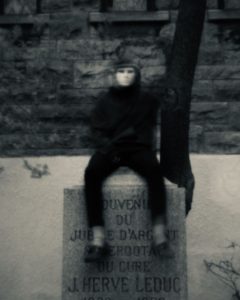The individual going by the stage name of Delachute wears a white mask in all his press photos and videos, but on his side of our videoconference call, the songwriter shows his true, likable face, that of a 30-ish man who’s not at all taciturn, contrary to what his music might suggest. The masked singer’s real name isn’t exactly a secret, but its owner kindly asks us to keep it so, not just to preserve his aura of mystery, but also for more sensible (and understandable) reasons.
 The truth is that, for a couple of years, Montréal’s indie-pop mystery man was working with the Parole Board of Canada as a regional communications officer, a job involving not only informing the media of Board decisions about the release of prisoners, but also supporting the victims of these criminals through the hearings process.
The truth is that, for a couple of years, Montréal’s indie-pop mystery man was working with the Parole Board of Canada as a regional communications officer, a job involving not only informing the media of Board decisions about the release of prisoners, but also supporting the victims of these criminals through the hearings process.
“My job didn’t involve providing psychological support as such, but one necessarily ends up developing a relationship with these people,” he says, who are often afraid that their aggressor, or a person close to them, might re-offend. “You’re talking with them on a daily basis, and they start telling you their life story, and the reasons why they’re now living in fear.”
Thus, one of the main reasons Delachute insists on remaining hidden is to prevent those victims and their families from recognizing themselves in his lyrics. The son of amateur musicians, the guy behind the avatar grew up in the town of Saint-Alexandre, in Québec’s Haut-Richelieu region, first playing bass in a rock band, then trading his amplifier for an acoustic guitar, as he was about to go to university.
The melancholy of the For Emma, Forever Ago (2007) album, recorded by Bon Iver alone in his father’s cabin, had a powerful effect on him, and gave him the courage to work by himself, in his bedroom, with his instruments and computer. “I’d really been impressed by seeing someone taking an idea and bringing it all the way to its conclusion, like a painter with a canvas,” says Delachute.
Between 2015 and 2020, Delachute’s alter ego refused to share his music with anyone except his sister and girlfriend. The latter persuaded him to send his demos to Mark Lawson (Arcade Fire, Beirut, Timber Timbre), who immediately agreed to mix his first song series.
Delachute’s hypnotic, enigmatic lullabies are based on bewitching rhythms that captivate the listener, with coiled guitars, and the falsetto voice of a singer who loves layering sounds. His sound is a mixture of bluesy despair (he’s a dedicated John Lee Hooker fan), synthetic textures, and strangely lecherous grooves that sound a little like a dance of death.
As for his lyrics, they’re borrowed from the horror stories that the artist has heard in the courtroom, including testimony from killers – who often spoke about love, despite the fact that their stories had nothing at all to do with it. “Songwriting truly helped me when I couldn’t fall asleep at night because I was thinking about everything those victims had gone through, and about those guys describing their murders,” says Delachute. “Those were surreal days, really.”
At no time did he intend to produce an aestheticized representation of violence, the songwriter adds, while at the same time referring to the recent, shocking wave of femicide in Québec. “Out of the 25 cases I became familiar with, at least 20 involved a man who had killed the woman he was either married to or living with,” he says. “I remember one particular story involving a man who was providing a play-by-play account of the murder he’d committed, the same way I’d describe a baseball game to you. He kept saying that he loved her, that he couldn’t bear the thought that she was leaving him. It was truly troubling.”
The enthusiasm on streaming platforms for his eponymous debut EP, which came out in March of 2021, took Delachute by surprise. He’s now busy writing new songs to provide him with a broad enough repertoire for future stage performances. Will he be wearing a mask then, we wonder? On the screen, the mystery man smiles. Chances are, when the rest of us finally get rid of our masks, he, too, will be putting his away.